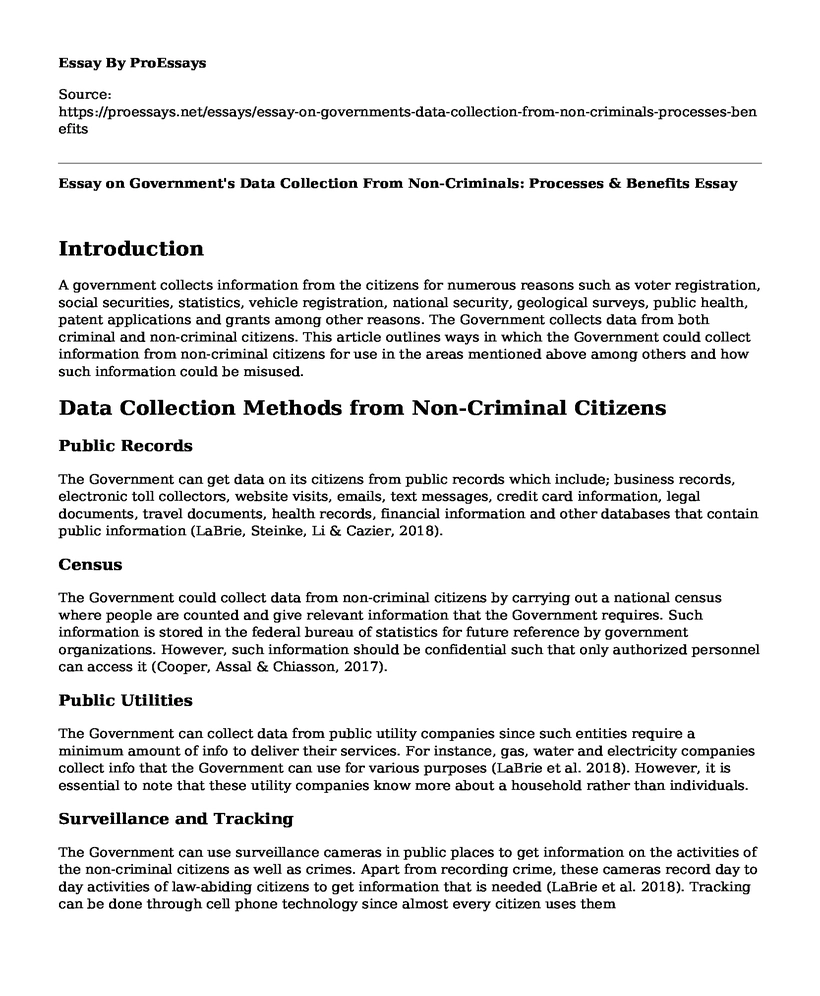Introduction
A government collects information from the citizens for numerous reasons such as voter registration, social securities, statistics, vehicle registration, national security, geological surveys, public health, patent applications and grants among other reasons. The Government collects data from both criminal and non-criminal citizens. This article outlines ways in which the Government could collect information from non-criminal citizens for use in the areas mentioned above among others and how such information could be misused.
Data Collection Methods from Non-Criminal Citizens
Public Records
The Government can get data on its citizens from public records which include; business records, electronic toll collectors, website visits, emails, text messages, credit card information, legal documents, travel documents, health records, financial information and other databases that contain public information (LaBrie, Steinke, Li & Cazier, 2018).
Census
The Government could collect data from non-criminal citizens by carrying out a national census where people are counted and give relevant information that the Government requires. Such information is stored in the federal bureau of statistics for future reference by government organizations. However, such information should be confidential such that only authorized personnel can access it (Cooper, Assal & Chiasson, 2017).
Public Utilities
The Government can collect data from public utility companies since such entities require a minimum amount of info to deliver their services. For instance, gas, water and electricity companies collect info that the Government can use for various purposes (LaBrie et al. 2018). However, it is essential to note that these utility companies know more about a household rather than individuals.
Surveillance and Tracking
The Government can use surveillance cameras in public places to get information on the activities of the non-criminal citizens as well as crimes. Apart from recording crime, these cameras record day to day activities of law-abiding citizens to get information that is needed (LaBrie et al. 2018). Tracking can be done through cell phone technology since almost every citizen uses them
How can the Data Collected by the Government be misused?
Data collected by the Government through the above methods should be private and confidential such that only authorized persons to have access to them, failure to which it can be misused through use in other ways rather than the intended purpose. Data can be abused in such ways as by politicians to strategize or other private parties in their gain (Cooper et al. 2017). The data can also be misused via manipulation to fit the specific needs of some people.
References
Cooper, R., Assal, H., & Chiasson, S. (2017). Cross-national privacy concerns on data collection by government agencies. Proceedings of the Privacy, Security and Trust, Calgary, AB, Canada, 28-30. Retrieved from: https://chorus.scs.carleton.ca/wp-content/papercite-data/pdf/cooper2017crossnational-pst.pdf
LaBrie, R. C., Steinke, G. H., Li, X., & Cazier, J. A. (2018). Big data analytics sentiment: US-China reaction to data collection by business and government. Technological Forecasting and Social Change, 130, 45-55. Retrieved from: https://www.sciencedirect.com/science/article/pii/S0040162517308612
Cite this page
Essay on Government's Data Collection From Non-Criminals: Processes & Benefits. (2023, Feb 09). Retrieved from https://proessays.net/essays/essay-on-governments-data-collection-from-non-criminals-processes-benefits
If you are the original author of this essay and no longer wish to have it published on the ProEssays website, please click below to request its removal:
- One Woman, One Vote Documentary Essay
- Essay Sample on the Most Admirable Leaders of the Past: Martin Luther King Junior
- Essay Example on Leadership: Motivating and Organizing People for Progression
- Essay on US Govt's WWII Decision to Draft Japanese-Americans: Justified?
- Essay Example on Righteous Music Website Breach Exposes Millions of Customers' Personal Data
- Paper Sample on Yes or No: External Environment's Impact on Capital Allocation
- Essay Example on Interpersonal, Verbal & Written Communication: Strengthening Relationships







